Introduction
Planning and managing large-scale events come with huge costs, from vendor management to venue selection and travel logistics. There's also the downside of limited audience reach, as not everyone can afford the stress and expense of attending in-person events. But what if you could bring people together from across the world on your platform without paying for these huge costs? That's what makes virtual conferences the go-to for most event organisers.
Virtual conferences allow you to reach large, global audiences and build a loyal community, without stepping out of your home or office. Some event management apps such as Eventify help organisers maintain the same level of engagement as an in-person event while creating a memorable experience. In this article, we will explore the key benefits of virtual events, how to plan virtual conferences, mistakes to avoid when planning and what to look out for when choosing the event app for your conference.
Why should you consider Virtual Conferences?
Moving your events online makes your brand limitless and strengthens your brand identity. Due to technological disruptions, the way people learn and connect keeps evolving and only brands that keep up will remain relevant. This is why virtual conferences are at the core of how brands reach their audiences.
Additionally, in-person events often exclude some participants due to travel costs, physical limitations or lifestyle choices. For instance, a nursing mother might find it difficult to attend an in-person event as her child demands her attention 24/7. However, virtual conferences remove the limitations, as anyone with an internet connection can join the conference. This results in a more diverse and inclusive audience, helping organisations generate new ideas and tap into new markets.
.jpg)
Benefits of Virtual Conferences
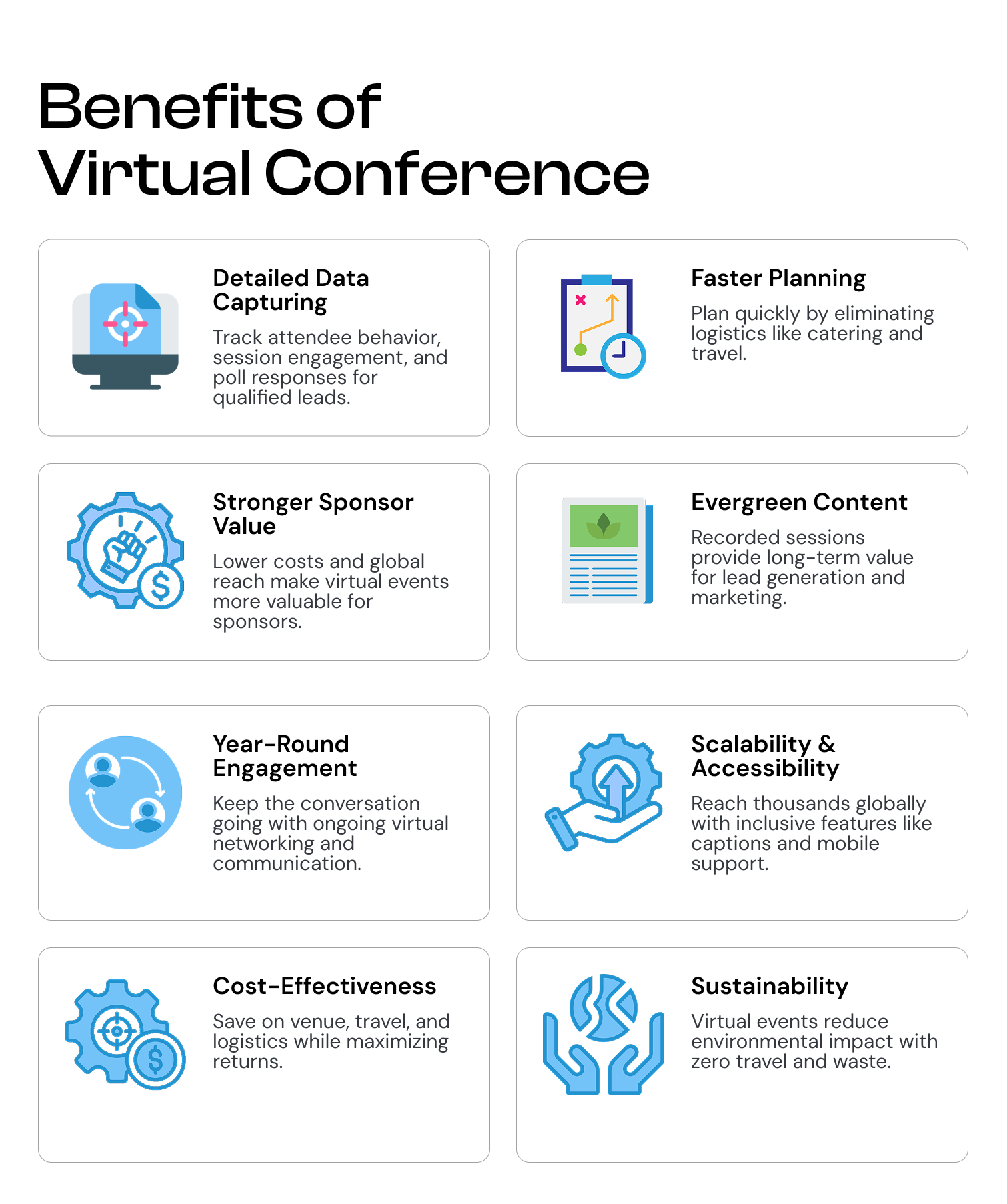
Virtual conferences aren’t just a buzzword; they are at the core of events today. They have redefined how businesses connect with their audience and how the market responds to consumer behaviour. Beyond the obvious benefits of greater reach and cost savings, below are eight benefits of virtual conferences;
1- Detailed data capturing
In-person events mostly don’t monitor and track attendee behaviour beyond check-in; however, virtual conferences are the opposite. Everything is monitored and captured, from polls answered, the number of people who answered, drop-off points to focus time per event session. This detailed data collection helps organisers provide sponsors and exhibitors with qualified leads based on attendee engagement, something which a physical conference does not provide. You can opt for a event management app like Eventify for data capturing or use event hosting website for it as well.
2- Faster planning cycles
Unlike physical conferences which take months to plan, virtual conferences have a much reduced timeline. Since major aspects such as catering, travel, vendor management, venue selection, etc., are eliminated in virtual conferences, organisers can focus on digital marketing and content quality. As such, virtual conferences allow for frequency, which helps keep the audience engaged and builds a strong community.
3- Stronger sponsor value
Virtual conferences offer more value for sponsors than physical conferences. The reduced costs make sponsorship more affordable as well as guarantee a higher return on investment. Besides, virtual conferences reach more people, allowing sponsors to connect with a global audience and generate more leads for their products or services. Also, digital platforms have multiple touchpoints to garner more exposure from ads in virtual booths and branded breakout rooms.
4- Evergreen content
A major benefit of virtual conferences is the recorded sessions which can be accessed anytime and even form part of your resource hub. The conference’s value doesn’t end with the conference as the content can be repurposed into lead generation and social media assets for years. This also ensures that attendees who miss any of the sessions can catch up, and the event organisers can turn those recordings into a passive revenue stream.
5- Year-round engagement
Unlike a physical conference where networking stops after attendees disperse, virtual conferences encourage sustained communication and connection especially through an event app. Attendees can keep checking in and following up on themselves, thereby strengthening the connection with your brand and evolving into a loyal and engaged community.
6- Scalability, flexibility and accessibility
Different types of attendees, irrespective of their professions, schedules, or locations can join from anywhere. Also, accessibility tools like event apps with captions, mobile-first interfaces and translations allow for an inclusive experience, while sessions can be recorded to be accessed long after the event ends. Unlike in-person events limited by space and time, virtual conferences can scale to thousands of participants across multiple locations.
7- Cost-effectiveness
Hosting in-person events can be costly, from venue setup to catering to logistics. Sometimes, event organisers struggle to make a profit from in-person events as organising costs can be higher than the revenue. However, virtual conferences allow you to cut those costs while maximising returns. Organisers can invest their funds into data-driven engagement and marketing, while attendees can save on travel and accommodation costs.
8- Sustainability
Virtual conferences align with sustainability goals and have less impact on the environment. They eliminate the need for printed materials, waste from food and drinks, travelling, etc. They also demonstrate that an organisation is eco-conscious, which resonates with many consumers and strengthens the organisation's brand equity.
How to Plan or Host a Virtual Conference
Planning a successful virtual conference requires more than just choosing a date and rolling out a marketing campaign to get people to attend. It requires end-to-end thorough thinking from choosing an event app to determining post-event activities. Below is a comprehensive, ten-step blueprint to help you plan a successful virtual conference:

1- Define what success looks like for you
First, decide what a successful virtual conference means to you. What are the success metrics? Is it to generate 1,000 leads or penetrate 5 international markets? Once defined, it’s easier to set your measurable key performance indicators.
Pro tip: Use your success metrics to filter the speaker and content submissions.
2- Determine the Virtual Conference agenda and schedule flow
Virtual sessions can’t be as long as in-person sessions. Shorter, more focused sessions and frequent breaks are required to keep your audience’s attention span. Prioritise high-energy, high-value content and keep to time. Also, decide on a structure and keep to it.
Pro tip: When reaching a global audience, take note of the time zone differences and anchor your critical content around the time that captures the most attendees.
3- Select a feature-rich event app
The event management platform you chose is the heart of your event, acting as the bridge between you and your audience. The right app will make your event successful. As such, you need an app with capabilities such as live polls, Q&As, in-app chats, networking rooms, etc.
Prof tip: Shortlist three to five event management platforms and get your team to test each for features that are most critical to your event.
4- Build mutually beneficial sponsorship and exhibitor packages
Create packages that mutually benefit your brand and sponsors and exhibitors who want to collaborate for the virtual conferences. Move away from offering digital placements for sponsors and exhibitors and provide value that enables them to quantify their ROI and lead generation immediately after the event.
Pro tip: Designate someone on your team whose job is to manage the sponsors and ensure they get the value accorded to them in their sponsorship package.
5- Design the full attendee journey
You don’t want attendees dropping off the session because it feels dry. Draw up a plan to keep your attendees engaged. Use live polls and games to encourage feedback and build excitement. Use in-event chats to encourage networking.
Pro tip: Hire a professional virtual event moderator for your virtual conference. Their job should be solely to facilitate transitions between sessions and maintain high energy.
6- Design a multi-channel marketing strategy
Your virtual conference starts the moment a potential attendee comes across your registration page. Ensure the landing page aligns with your brand and offers the major details about the speakers and agenda. Leverage different marketing channels email, social media, paid ads, etc. to reach your audience. Tailor the message to each platform and highlight the tangible benefits attendees will get. You can also choose an event app like Eventify as your marketing all-in-one solution.
Pro tip: Test all links before you include them in your marketing messages. Always have a clear and specific CTA for each platform, and use eye-grabbing visuals.
7- Curate and train speakers
Another thing that makes or mars a conference is the quality of speakers. After deciding the content, curate the speakers and train them for the virtual conference. You can help the speaker while compiling detailed guidelines on how to navigate the features of the event management app you choose.
Pro tip: Schedule a mandatory tech check and rehearsal with all the speakers before the event to ensure you're all on the same page.
8- Set up a contingency plan
You may have the best team and tools at your disposal, but anything can still go wrong. Anticipate technical failures and prepare contingency plans. Set up a dedicated live technical team that will be available throughout the conferences too.
Pro tip: Create a private channel for all speakers and teams for discreet communication in case of disruptions.
9- Run a full dress rehearsal
Before the virtual conference goes live, run a full dress rehearsal of the entire agenda flow, including transitions, engagement features, speakers’ sessions, etc. This step is different from training each speaker on how to navigate the platform; it instead tests how ready the event platform and team are for the virtual conferences. Test the backup plan as well.
Pro tip: Conduct the full dress rehearsal at the exact time for the virtual conference to track internet connection in different time zones.
10- Capture feedback immediately
Don’t wait till the end of the conference to monitor and track attendee behaviour. Capture the feedback, whether it’s a comment, emoji, etc. as it comes. Also, send out the post-event survey immediately after the event. Check the data against your success metrics. Within 1-2 days, send a follow-up email containing recorded sessions, links to connect with the speakers and a call-to-action for the next phase (e.g. buying a product).
Pro tip: Ensure your follow-up emails are sent to the right people based on attendee behaviour.
Mistakes to avoid when planning a virtual conference
While detailed planning can ensure a smooth virtual conference, there are multiple failure points in the process if you make mistakes. Total success depends on knowing the common mistakes that can derail the conference and proactively avoiding the conditions that cause them. Below are five major pitfalls to avoid when planning your virtual conference;
.jpg)
1- Designing a conference agenda that causes fatigue
Virtual attendees have fragile attention spans. Designing sessions to go for hours upon hours will lead to mental fatigue and high drop-off rates. Also, a passive session without energy or interaction causes attendees to tune out no faster than they join.
Solution : Design your agenda to focus on active learning, concise delivery, short sessions and breaks in between. Also, use engagement features like Q&As and live polls to force audience engagement. Show your attendees you respect them by keeping to time.
2- Not setting up contingency plans
Believing that technology is infallible or that every speaker knows how to navigate the event app perfectly can set you up for failure. During the session, the speaker’s mic can fail or their internet can disconnect. Any logistical failure tarnishes the brand.
Solution: Set up a mandatory dry run for all speakers and moderators at least 3 days before the event, using the exact platform, equipment and internet connection they will use for the conference. Also, add everyone to a private chat to discreetly solve issues if any arise during the conference.
3- Treating networking as unimportant
Networking is one of the major reasons people attend conferences. They want to acquire some social capital before leaving the event, but failing to set up a professional way for them to connect doesn’t look good for your brand. It results in low attendee and sponsor satisfaction.
Solution: Choose a platform that offers intuitive networking features such as Eventify. Actively encourage attendees to connect by scheduling mandatory breakout sessions. You can match people using AI-powered matchmaking for themed discussions.
4- Not delivering measurable ROI
Failing to deliver measurable ROI for your sponsors can be catastrophic. Sponsors pay to generate qualified leads from a target audience. Without measurable ROI, they cannot justify their investments, making it impossible to secure their commitment for future events.
Solution: Provide actionable, trackable opportunities for your sponsors. Ensure they get details of their qualified leads. Let them run their virtual booths, downloadable resources and targeted ads at key moments during the conference. Use apps like Eventify for live lead anaylsis and reporting. This satisfies all stakeholders and guarantees future collaboration.
5- Not following up on attendees
Virtual conferences capture a lot of behavioural data that you can’t get at an in-person event. The mistake is not following up on this data to nurture qualified leads and generate sales and lifetime customers for you and your sponsors.
Solution: Integrate CRM tools on your event platform to help you manage data. Segment the data based on engagement levels and tailor your follow-up communication accordingly. These targeted messages often lead to the greatest ROI from the conference.
Features to consider while choosing an app for virtual conferences
Planning a successful virtual conference starts with selecting the right event management app, as it determines how well your attendees engage, how you secure sponsors, the quality of data you get and your revenue. A truly effective app is an all-in-one platform that streamlines the entire process from start to finish.
1- Integrated event ticketing system

Registration and ticketing are the first major touchpoints for an attendee. As such, they must be easy to use, support flexible prices, and be built on a robust security architecture. Look for an event management app that provides smart registration and ticketing without unnecessary delay when it comes to payment.
2- Robust attendee engagement and community building
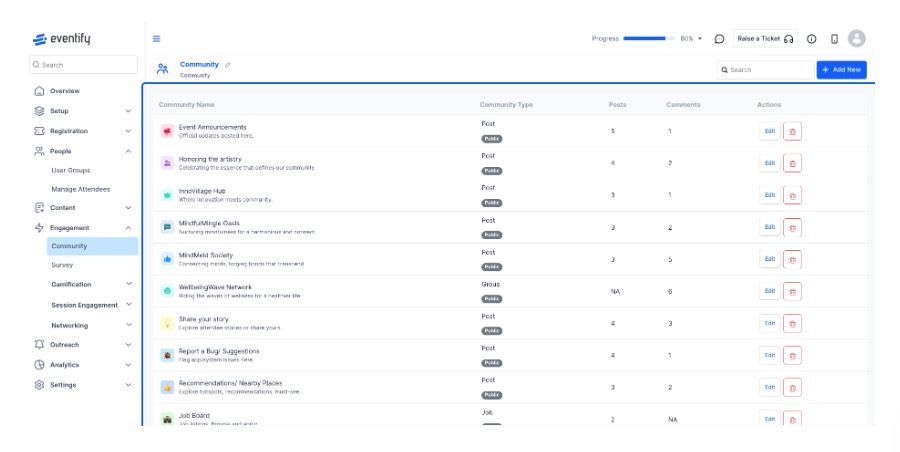
The right app must have a range of engagement features that keep attendees engaged. These can include Q&As, live polling, one-on-one messaging, games, etc. These tools ensure attendees aren’t taken over by fatigue or drop off from the session. They help attendees maintain their energy levels. Additionally, attendees can build on these connections to form strong communities with both short and long-term benefits.
3- Strong Sponsor and Exhibitor Ecosystem
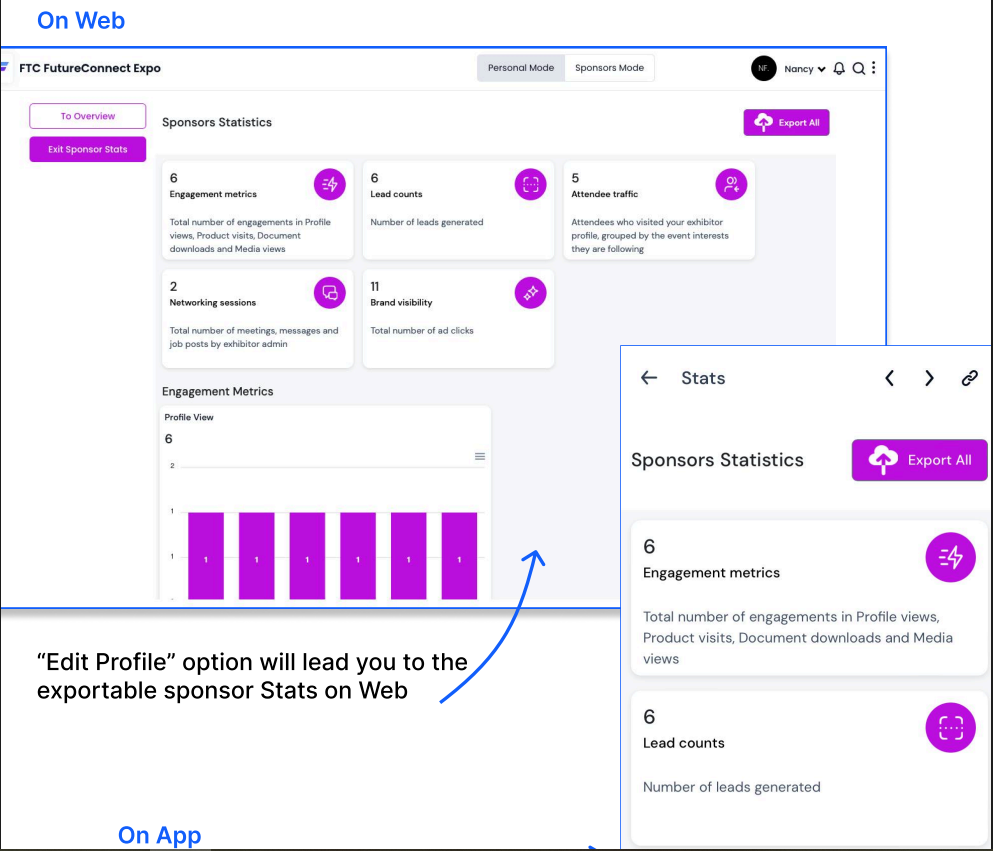
Sponsors and exhibitors are vital to your virtual conferences. The app you choose must have a dynamic, dedicated space that helps sponsors host videos, upload their downloadable resources and retrieve quality leads. Opt for the platform like Eventify that helps satisfy your audience and sponsors.
4- Robust data analytics
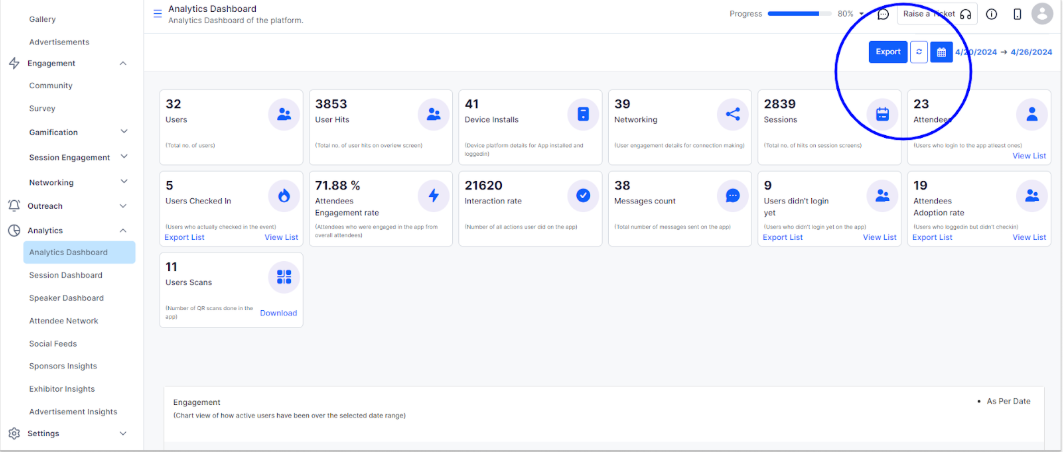
One of the biggest benefits of virtual conferences is the wealth of data they provide. The event app you choose must offer advanced post-event analytics beyond attendance counts and duration. It must also seamlessly integrate with CRM and marketing tools and allow you to export the data. Additionally, look out for the one that has an intuitive dashboard and delivers highly-segmented, post-event follow-up.
5- Efficient content management and delivery tools
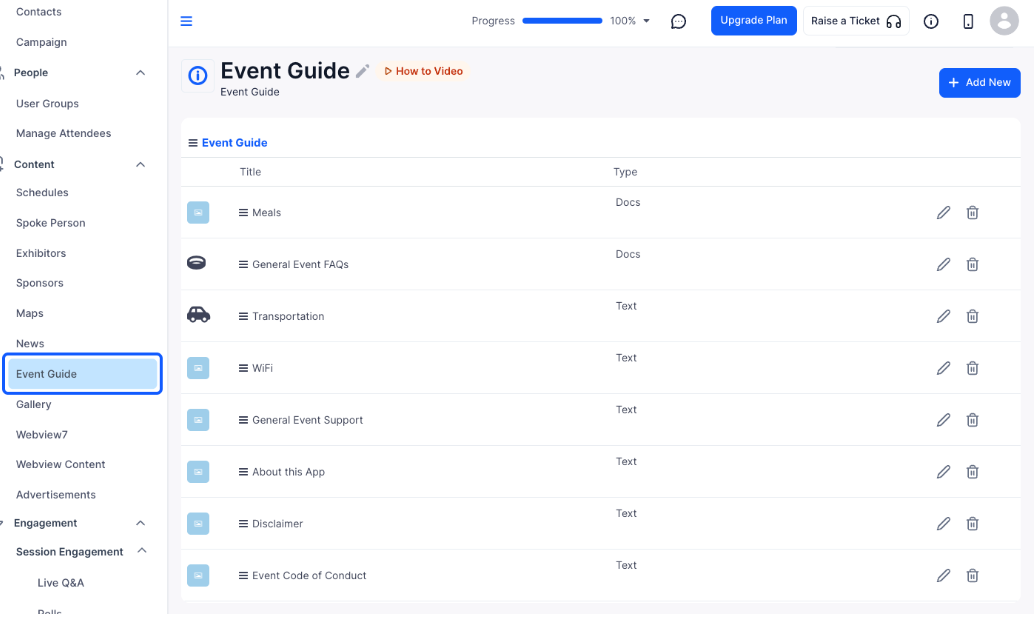
An event management app must have efficient content management and delivery tools. Attendees should be updated on the sessions, speakers and other necessary items in the agenda. The app should also handle both live and on-demand content with flexible access controls and high-definition streaming.
Measuring Virtual Conference Success
1. Key Metrics to Track
- Registration Metrics: Conversion rates, sources, drop-off points
- Attendance Metrics: Live vs. on-demand, session attendance rates, average time spent
- Engagement Metrics: Poll participation, Q&A questions, chat messages, network connections
- Business Metrics: Leads generated, pipeline influenced, deals closed
2. Post-Event Surveys & Feedback
- Timing: Send within 24 hours while experience is fresh
- Length: 5-7 minutes maximum completion time
- Question Types: NPS, CSAT, qualitative open-ended questions
- Incentives: Drawing for prize for completed surveys
3. ROI Calculation Methods
- Direct Revenue: Ticket sales, sponsorship revenue
- Lead Value: Marketing qualified leads × conversion rate × average deal size
- Cost Savings: Compared to equivalent in-person event
- Soft Benefits: Brand awareness, thought leadership, customer loyalty metrics
4. Attendee Engagement Analytics
- Heat Maps: Most visited areas of virtual venue
- Content Analytics: Most downloaded/resources, most replayed sessions
- Networking Analytics: Connection rates, meeting outcomes
- Path Analysis: Common attendee journeys through the event
Virtual Conference Trends in 2026
Here are a few trends we are looking forward seeing in the advancement to 2026:
1. AI & Automation Integration
The system will create customized event schedules for attendees while delivering direct language translation services and generating session summaries and utilizing predictive analytics to assess user participation patterns and determine which users need special attention.
2. Hybrid Conference Models
The upcoming conference models will employ hub-and-spoke systems that connect a main physical location with remote participants through reverse hybrid systems which start with online meetings followed by local gatherings and use asynchronous content delivery methods together with real-time discussion and international outreach through regionally tailored solutions.
3. Metaverse & VR Experiences
The future of conferences will transform into fully interactive 3D digital spaces which enable attendees to network through their virtual avatars and experience authentic discussions via spatial audio technology and access unique VR content that exceeds conventional video grid presentations.
Top 3 Apps for Virtual Conferences Planning and Execution
Selecting the right event platform for your virtual conferences requires balancing your event's priorities, budget, preferences, etc. While there are major players in the industry such as Cvent and Eventbrite, Eventify has emerged as an all-in-one event management platform that streamlines the entire process without the complexity of older event management platforms.
Eventify
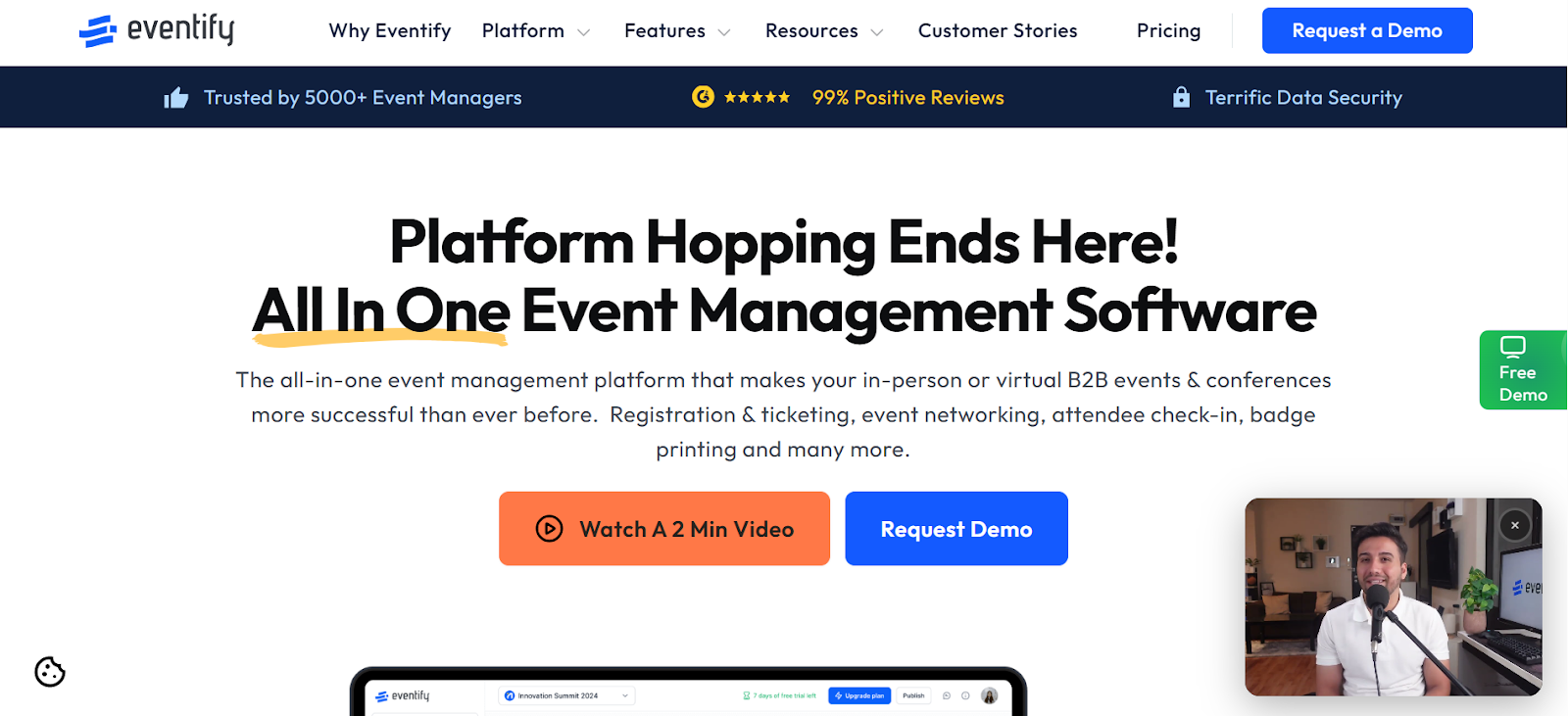
Eventify is a comprehensive, all-in-one event management platform that prioritises attendee satisfaction, measurable ROI and robust data analytics. It is an excellent choice for virtual conferences as it uses AI-powered matchmaking, live polls and gamification to encourage networking among attendees and generate highly qualified leads for sponsors and organisers. This ensures your sponsors receive commensurate value for their investments. Following are the feature that will facilitate your Virtual conference:
Key Features
- AI-Powered Matchmaking
- Interactive Engagement Tools
- Robust Data & Analytics Dashboard
- Virtual Booths & Sponsor / Exhibitor Features
- White-Label Customisation
- Built-In Event Ticketing & Registration
- High-Value Sponsor Visibility
- Easy Third-Party Integrations
- Security & Reliability
Cvent
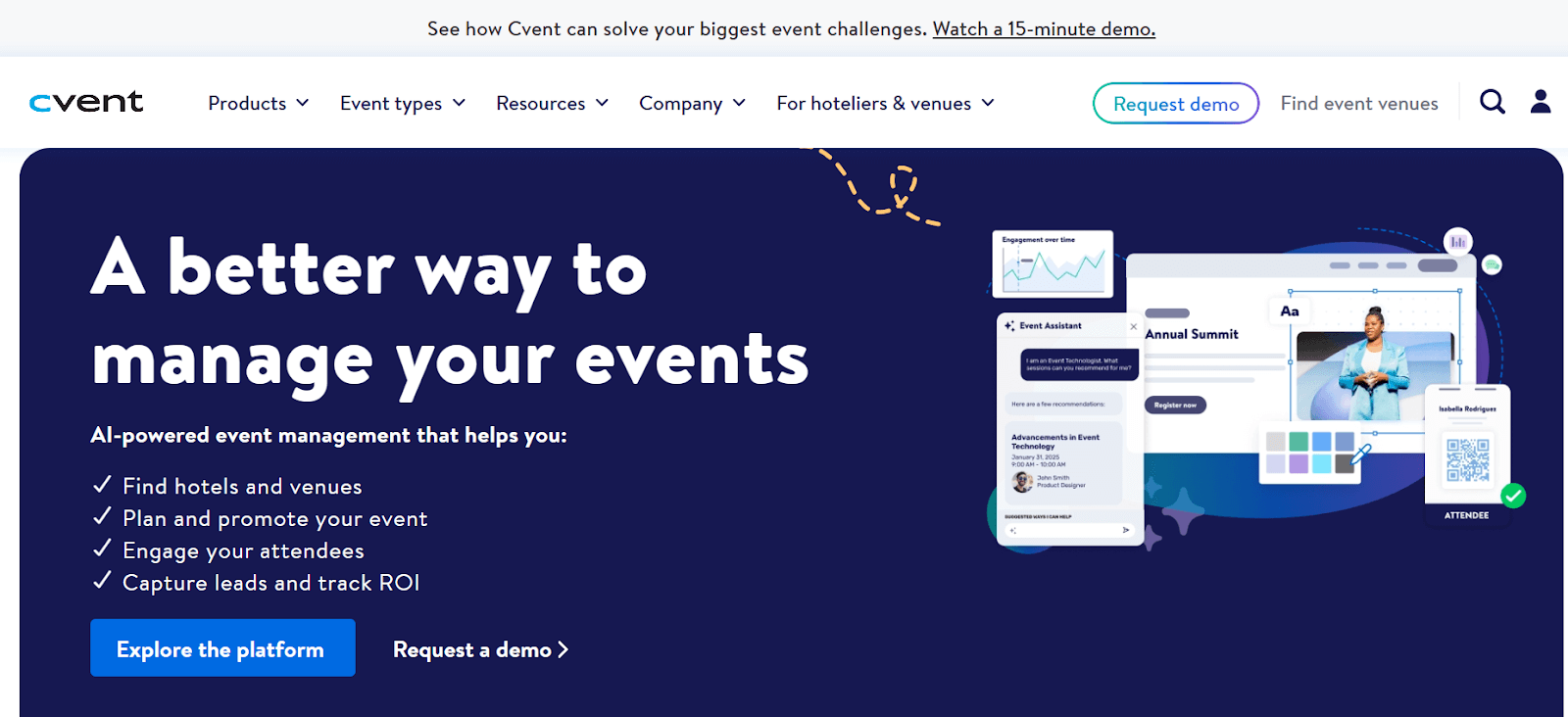
Cvent is an established player in the events industry and primarily caters to large organisations and associations by providing enterprise-grade services that integrate with complex logistics such as venue and travel management. For virtual conferences, its primary benefit is its ability to manage massive attendee databases and integrate with high-level apps. However, it has a steep learning curve and its services are often cost-prohibitive for small and mid-sized event organisers.
Key Features
- Scalability & Session Management
- Multiple Engagement Tools
- Customization & Branding
- Data, Analytics & Lead Tracking
- Easy Third-Party Integrations
Eventbrite
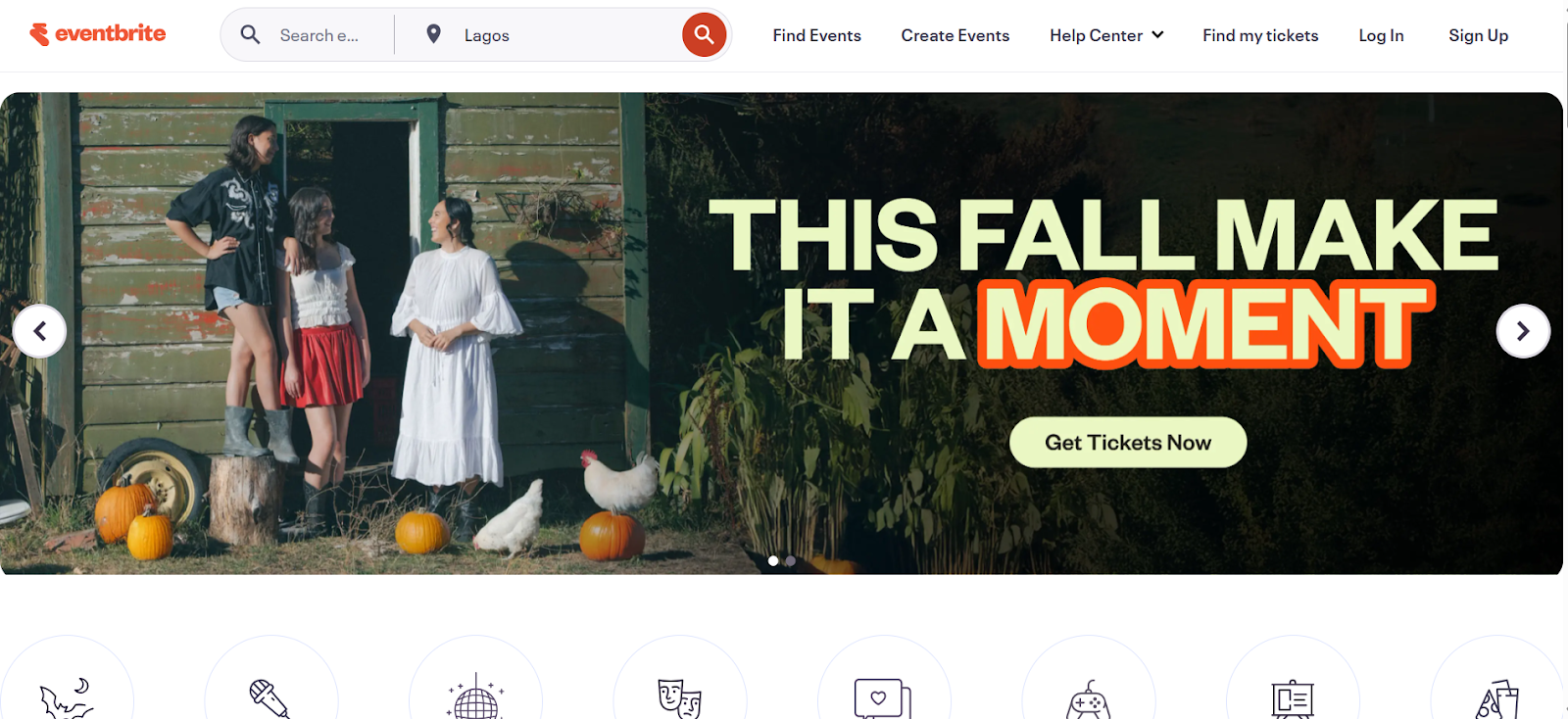
Eventbrite is a global marketplace that connects event organisers and attendees. Its strength lies in event discovery, simple and fast setup, and its active audience of ticket buyers. It also helps the organisers with audience acquisition. However, for high-profile virtual conferences, organisers find its limited networking and branding features and lack of granular data means they have to integrate third-party solutions for professional results.
Key Features
- Integrated Ticketing & Registration
- Branding & Customization
- Scalability & Session Management
- Multiple Engagement Tools
- Analytics, Reporting & Insights
Organise Your Virtual Conferences Using Eventify
Planning and organising your event requires selecting an event management app that treats your virtual conference as an integrated, measurable asset. Whatever your event goals are, whether lead generation, stronger brand awareness, strong sponsor ROI, etc., Eventify is well-positioned to handle them. With built-in features such as robust content management, advanced reporting, and engagement tools, Eventify allows you to bypass the complexities of enterprise platforms and the networking limitations of ticketing marketplaces. This allows you to secure high-value sponsorships, build a vibrant community and provide superior content. Start planning your virtual conference today with Eventify check out this free demo to get started.
Frequently Asked Questions
1- What is different between a Webinar and a Virtual conference?
A: A webinar is a one-to-many online seminar, focused on presentation and Q&A. A virtual conference is a large, multisession online event replicating a physical conference including keynotes, breakouts, networking lounges, and exhibitor halls. It offers a complex, interactive, and immersive attendee experience.
2- How long a virtual conference should be?
A: There is no hard rule about the during of a virtual conference. It can be of 2 to 4 hours per day over 1 to 3 days or just 2 to 3 hours on a single day depending on the material. This prevent the attendees to lost interest. The key is to offer a mix of live, interactive sessions and on-demand content, allowing for a flexible, engaging experience.
3- How Do You Keep Attendees Engaged During a Virtual Conference?
A: Interactive sessions are what make the virtual conference interesting. You can use live polls, Q&A sessions, and gamification with points or prizes. You can easily facilitate real connection through dedicated networking breaks, AI-powered meetups, and themed breakout rooms. Be creative, mix content formats and keep presentations dynamic to maintain energy and fight virtual fatigue.






.png)





